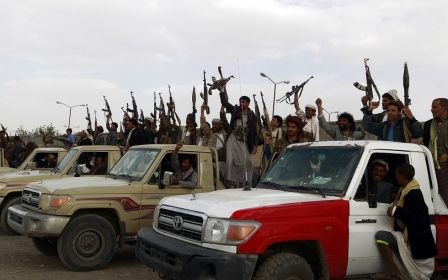Yemen's Houthis must withdraw and disarm before any peace deal: Government

The Yemeni government said on Thursday that Houthi rebels must withdraw from all territory they have seized since 2014 and hand back control of state institutions ahead of any political settlement.
The statement from the government delegation at peace talks in Kuwait is a new blow to proposals put forward by UN mediators in an effort to close the gap between the warring parties.
On Wednesday, the rebel delegation said it would not sign up to any deal on military and security issues until there was agreement on a consensus president and a national unity government to oversee the transition.
The peace roadmap put forward by UN envoy Ismail Ould Cheikh Ahmed proposed the formation of a unity government in tandem with the withdrawal and disarmament of the rebels, although he acknowledged major differences between the two sides on their sequencing.
The government delegation said "nothing has been agreed" in the two months of negotiations in Kuwait.
"There can be no talk of any political arrangements before the (Houthi) militias completely withdraw and hand over their weapons, and state institutions and agencies are restored to the legitimate government," it said.
"Any political partnership in the future must be between political parties and groups that have no militias."
Despite a 15-month-old Saudi-led military intervention in support of the government of President Abd Mansour Hadi, the rebels and their allies remain in control of swathes of territory they have controlled since 2014, including the capital Sanaa.
More than 6,400 people have been killed since the intervention began, the majority of them civilians, and there has been growing international pressure for an end to the conflict.
But as the talks in Kuwait have dragged on, there have been a growing number of breaches of a UN-brokered ceasefire that went into effect on 11 April.
Stay informed with MEE's newsletters
Sign up to get the latest alerts, insights and analysis, starting with Turkey Unpacked
Middle East Eye delivers independent and unrivalled coverage and analysis of the Middle East, North Africa and beyond. To learn more about republishing this content and the associated fees, please fill out this form. More about MEE can be found here.




